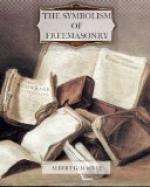ASHLAR, PERFECT. A stone that has been hewed, squared, and polished, so as to be fit for use in the building. Masonically, it is a symbol of the state of perfection attained by means of education. And as it is the object of Speculative Masonry to produce this state of perfection, it may in that point of view be also considered as a symbol of the social character of the institution of Freemasonry.
ASHLAR, ROUGH. A stone in its rude and natural state. Masonically, it is a symbol of men’s natural state of ignorance. But if the perfect ashlar be, in reference to its mode of preparation, considered as a symbol of the social character of Freemasonry, then the rough ashlar must be considered as a symbol of the profane world. In this species of symbolism, the rough and perfect ashlars bear the same relation to each other as ignorance does to knowledge, death to life, and light to darkness. The rough ashlar is the profane, the perfect ashlar is the initiate.
ASHMOLE, ELIAS. A celebrated antiquary of England, who was born in 1617. He has written an autobiography, or rather diary of his life, which extends to within eight years of his death. Under the date of October 16, 1646, he has made the following entry: “I was made a Free-Mason at Warrington, in Lancashire, with Col. Henry Mainwaring, of Carticham, in Cheshire; the names of those that were then at the lodge: Mr. Richard Penket, warden; Mr. James Collier, Mr. Richard Sankey, Henry Littler, John Ellam and Hugh Brewer.” Thirty-six years afterwards, under date of March 10, 1682, he makes the following entry: “I received a summons to appear at a lodge to be held the next day at Masons’ Hall, in London. 11. Accordingly I went, and about noon was admitted into the fellowship of Freemasons by Sir William Wilson, Knight, Captain Richard Borthwick, Mr. William Woodman, Mr. William Grey, Mr. Samuel Taylour, and Mr. William Wise. I was the senior fellow among them (it being thirty-five years since I was admitted); there was present beside myself the fellows after named: Mr. Thomas Wise, master of the Masons’ Company this year; Mr. Thomas Shorthose, Mr. Thomas Shadbolt, —— Waidsfford, Esq., Mr. Nicholas Young, Mr. John Shorthose, Mr. William Hamon, Mr. John Thompson, and Mr. William Stanton. We all dined at the Half-Moon Tavern, in Cheapside, at a noble dinner prepared at the charge of the new-accepted Masons.” The titles of some of the persons named in these two receptions confirm what is said in the text, that the operative was at that time being superseded by the speculative element. It is deeply to be regretted that Ashmole did not carry out his projected design of writing a history of Freemasonry, for which it is said that he had collected abundant materials. His History of the Order of the Garter shows what we might have expected from his treatment of the masonic institution.
ASPIRANT. One who aspires to or seeks after the truth. The title given to the candidate in the ancient Mysteries.




